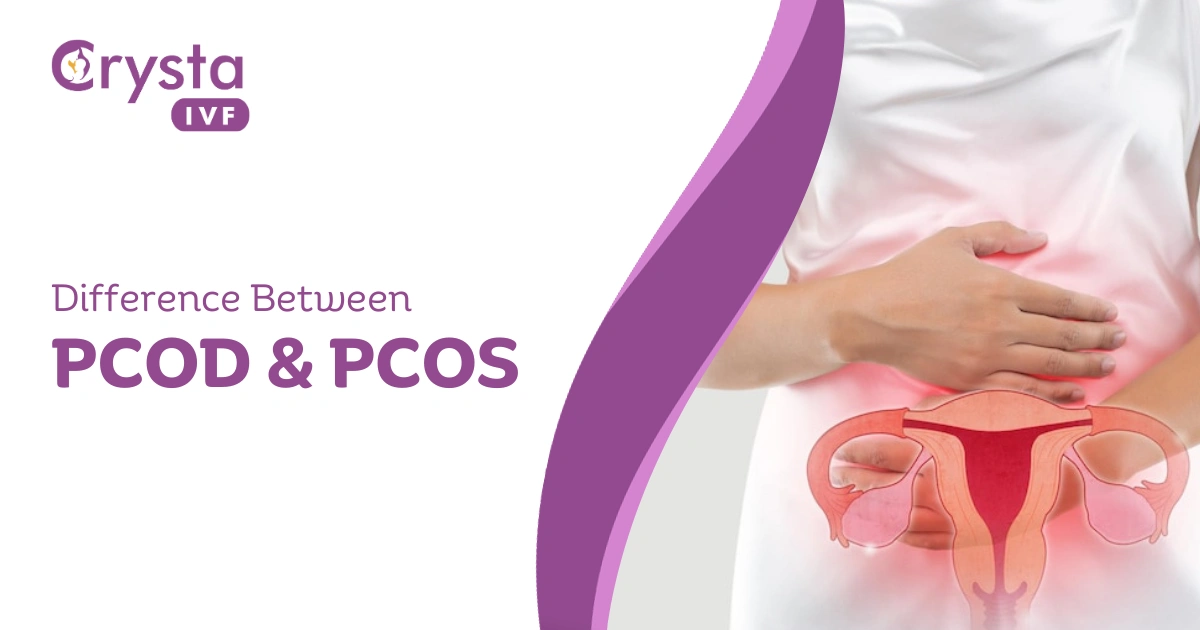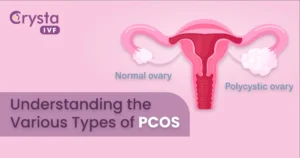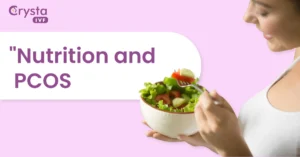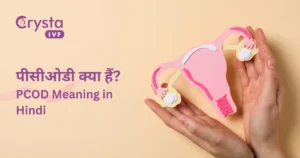People often confuse the terms PCOD and PCOS and use them interchangeably. But these are two different terms and indicate different reproductive conditions in women. The key difference between the symptoms of both is that both are very mild. Both conditions occur due to hormonal disorders in women. PCOD stands for polycystic ovarian disorder, while PCOS stands for Polycystic Ovarian Syndrome. PCOD is a hormone imbalance that causes enlarged follicles in ovaries, and these follicles can cause irregular menstrual cycles and infertility. On the other hand, PCOS is an endocrine disorder that causes multiple cysts to form in the ovaries. It causes irregular periods, excessive body hair and weight gain.
Here in this blog, we will understand both conditions, their differences and their similarities. We will learn the symptoms, seriousness and treatment methods of each condition.
PCOD and PCOS- The Difference
Both conditions are severe and need early attention to get treated and control the symptoms. PCOD can be managed with lifestyle changes like healthy eating, exercising, and active lifestyle and may not require medical treatment. However, your doctor is the right person who can advise you on the best treatment options. PCOS is an endocrine disorder, and it has more severe implications and effects on women’s health. PCOS affects 4%–20% of women of reproductive age worldwide.
Along with that, PCOD is also one common health condition in women, which is about 1/3rd of all menstruating women around the globe. PCOS is not that common, but it is also not a rare condition. As per statis, in southern India and Maharashtra, 9.13% of menstruating women suffer from PCOS, while 22.5% have PCOD.
Both conditions affect fertility, but not to the same extent. With PCOD, if you take extra precaution and care, medication pregnancy is possible, while on the other hand, PCOS disturbs hormone levels and makes it harder to conceive. Consult with the best fertility specialist in Lucknow to identify your condition and take preventive measures to deal with the health issues.
Understand the PCOD and PCOS Conditions
What is PCOD?
PCOD full form is Polycystic Ovarian Disorder, a condition that affects ovaries during their reproductive age. The small cysts form on the ovaries, which may cause irregular menstrual cycles and hormonal imbalances. This menstrual cycle is disturbed due to hormonal changes, insulin resistance, and genes. Women suffering from PCOD may experience ovulation or no ovulation at all. The common symptoms include irregular menstrual cycles, weight gain, excess hair growth (hirsutism), and hair thinning. The people who are experiencing the symptoms of PCOD must consult with their healthcare provider for proper diagnosis and personalized treatment. The treatment options for PCOD often include lifestyle changes, like diet modifications and exercise, as well as medications to regulate menstrual cycles and manage symptoms.
Explore more: What is PCOD: Everything You Need to Know?
What is PCOS?
An estimated 1 in 5 (20%) Indian women suffer from PCOS. If the condition is not monitored in time, the condition can have severe health impacts. PCOS full form, is Polycystic Ovary Syndrome, which is a metabolic disorder which is affected by hormonal imbalance. Women may often experience symptoms like irregular periods and abnormal hair growth on the body and face. Furthermore, it can lead to heart disease and diabetes in the long term. Women may often experience symptoms like irregular periods and abnormal hair growth on the body and face. Furthermore, PCOS is linked with metabolic disturbances and can cause long-term health issues like abnormal blood sugar levels and higher levels of cholesterol and triglycerides, which may contribute to heart diseases.
Also read: Best Age to Get Pregnant with PCOS
What are the symptoms of PCOD and PCOS?
The symptoms of PCOD and PCOS are similar, but the severity may vary from person to person. Here are some common symptoms mentioned below:
- Irregular Menstrual cycles
- Irregular ovulation can cause fertility challenges and difficulty in conceiving.
- One of the common symptoms is irregular periods. Usually, the menstrual cycle takes 28 days, but if it’s before or after time, it’s abnormal. Some people also experience missing periods.
- Changes in mood swings, anxiety, or depression.
- High androgen hormone levels can cause symptoms like acne, oily skin, and excess hair growth on the face and chest.
- Weight increases are common in people with PCOS/PCOD.
- Women may face hair-thinning issues.
- Skin darkening
- Insulin resistance is another common symptom which causes weight gain and other metabolic issues.
Tips to manage PCOD and PCOS
To manage the symptoms of PCOD and PCOS, it’s important to follow a healthy lifestyle. Here are essential tips following which you can ease the symptoms-
- Maintain a healthy weight- One of the major issues women experience with PCOD and PCOS is obesity. Managing your weight through diet and exercise is important to improve the symptoms. Maintaining weight will also help manage your cholesterol levels, blood pressure, and other health issues.
- Limit your carbohydrate Consumption: Be mindful while choosing what you eat. Follow a low-carb diet to maintain your insulin levels. Eat fish, meat, eggs, and vegetables containing natural fats and avoid sugar and starchy foods.
- Regular Exercise- A sedentary lifestyle may worsen your symptoms and conditions. Therefore, engage in regular physical activity, like brisk walking, jogging or yoga.
- Regular Health Visits- Discuss your concerns and symptoms with your healthcare provider. Schedule regular health checkups with fertility specialists at the best IVF Centre in Lucknow to monitor and guide your condition.
- Stay hydrated- Drink plenty of water to support overall health. Daily, 8-9 glasses of water are recommended to keep yourself hydrated and healthy.
- Medications- Take prescribed medications such as hormonal birth control to regulate the menstrual cycle.
- Manage Stress- Stress can elevate the symptoms of PCOS and PCOD. Try to manage symptoms with meditation and deep breathing exercises.
Diet plan for PCOD and PCOS
While diets do not directly help to cure PCOD and PCOS, a healthy diet can effectively help to manage the symptoms. PCOS is linked with obesity and overweight-like conditions, so it becomes harder for women to lose weight. But with the right diet and healthy lifestyle, you can manage these conditions. Try to eat in smaller portions. Plan your meal as mentioned above:
- Breakfast- You can add chia seeds, oats, fruit custards, fruit salads, veggies, and toast-like options to your morning meal. Plan your breakfast time between 8 to 9 AM.
- Mid-morning Snack- This is when you might feel hungry between 11 to 12 AM. You can eat a limited quantity of apples, carrots, cucumbers, nuts and other fruits.
- Lunch- Plan your lunch time between 1 to 3 PM. You can choose from options like grilled chicken, tofu salad, green veggies salad, quinoa bowl, chickpeas, brown rice and 1 Chapati with lots of veggies.
- Evening Snack- This is the evening time, between 4 and 6, when you need snacks and munchies. You can fulfil your cravings with fresh fruits, nuts, sweet potato, almond milk or smoothie, and a vegetable sandwich.
- Dinner- Try to plan your dinner time between 7 to 9 PM at least one hour before bed. You have options like quinoa, brown rice, green beans, legume salad like chickpeas, kidney beans, and lentil soup.
Healthy Eating Tips
- Focus on green vegetables, lean proteins, and whole grains.
- Avoid overeating and divide your meals into smaller options.
- Limit processed foods by avoiding sugary snacks and refined carbohydrates.
- Take your meals and snacks to maintain steady blood sugar levels.
- Avoid junk foods.
Read More: How to cure PCOS permanently?
Takeaway
Managing PCOD and PCOS is difficult, but with a healthy lifestyle, you can ease your living. If you notice irregular periods or other abnormalities, get diagnoses as quickly as possible. The timely treatments ensure a healthy reproductive life. Consult with your best fertility specialist, eat healthy, exercise regularly, and take regular health checkups from the best IVF Centre in Lucknow.
 Verified by Crysta IVF Fertility Experts
Verified by Crysta IVF Fertility Experts
Related Post:
PCOS Meaning in Hindi – पीसीओएस क्या है?




